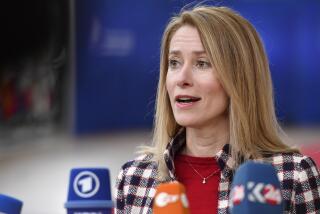Iran agrees to exchange of nuclear material
Reporting from Beirut â In what could be a stunning breakthrough in the years-long diplomatic deadlock over Iranâs nuclear program, Tehran has agreed to send the bulk of its nuclear material to Turkey as part of an exchange meant to ease international concerns about the Islamic Republicâs aims and provide fuel for an ailing medical reactor, the spokesman for Iranâs foreign ministry told state television Monday morning.
Iranian foreign ministry spokesman Ramin Mehmanparast told state television that a letter describing the deal would be sent to the Vienna-based International Atomic Energy Agency within a week.
âAfter a final agreement is signed between Iran and the Vienna group, our fuel will be shipped to Turkey under the supervision of Iran and the IAEA,â he told journalists on the sidelines of a conference of developing nations. âThen we will dispatch 1,200 kilograms [2,640 pounds] of 3.5% enriched uranium to Turkey to be exchanged for 120 kilograms [264 pounds] of 20% enriched uranium from the Vienna group.â
The Vienna group refers to the five permanent members of the United Nations Security Council -- the United States, France, Britain, Russia and China -- and Germany, which engaged in talks with Iran last October.
FOR THE RECORD:
Iran nuclear deal: An article in some editions of Mondayâs LATExtra section about Iran agreeing to an exchange of nuclear material identified the Vienna group as the five permanent members of the United Nations Security Council âthe United States, France, Britain, Russia and China -- and Germany. The Vienna group comprises Russia, France, the United States and the International Atomic Energy Agency.
The deal was brokered during an 18-hour session Sunday by leaders of Brazil and Turkey during a visit to Tehran. A joint statement was signed by the foreign ministers of all three countries and witnessed by Iranian President Mahmoud Ahmadinejad, Brazilian President Luiz Inacio Lula da Silva and Turkish Prime Minister Recep Erdogan, state radio reported.
Afterward, Ahmadinejad called on the West to return to talks.
âFollowing the signing of the nuclear fuel swap deal, it is time ... to enter talks with Iran based on honesty, justice and mutual respect,â Ahmadinejad said, according to Reuters.
The deal appears to build upon an IAEA proposal last year that was endorsed by the Obama administration and Western powers.
Iran was to send around 2,640 pounds of its low-enriched uranium to Russia to be further refined and afterward to France to be converted into 20%-enriched fuel plates for the Tehran Research Reactor. The compromise was to serve as a way of drawing Iranâs supply of nuclear material below the threshold for building a bomb and to create an atmosphere for a broader deal between the West and Iran.
That deal faltered when Iran appeared to back away, with political factions in Tehran accusing the West of trying to swindle Iran out of its stockpile. A few months ago, upping tensions with the West, Iran began producing its own 20% enriched uranium, a move that diplomats and nonproliferation experts worried could bring Iran closer to the highly enriched uranium needed to fuel an atom bomb.
If a deal comes to fruition it would mark yet another milestone in the rise of new powers challenging the domination of the West. Brazil and Turkey are both rapidly emerging regional and global economic powers seeking to enhance their stature with diplomatic triumphs.
But many questions remain about the new deal. Only a handful of countries, including France and Argentina, are said to have the capacity to create the specialized fuel plates for the Tehran medical reactor, built by the United States before Iranâs 1979 revolution.
The deal could also fall prey to factional battles within Iranâs domestic politics, where any sign of weakness in the face of Western powers is viewed as selling out the nation. And it could also be rejected by the Obama administration, which has shifted its tactics from diplomatic outreach to Iran toward a push for isolating the country by tightening sanctions.
Obama is also under pressure by conservatives in Washington to take a tougher line on Iran.
Turkey does not enrich uranium. Though Mehmanparast said Turkey has agreed to serve as the venue for the fuel exchange, it remains unclear whether it would serve as a guarantor for the low-enriched uranium or whether the material would be shipped to a nation with refinement capacity such as Russia, Brazil or France.
More to Read
Sign up for Essential California
The most important California stories and recommendations in your inbox every morning.
You may occasionally receive promotional content from the Los Angeles Times.










